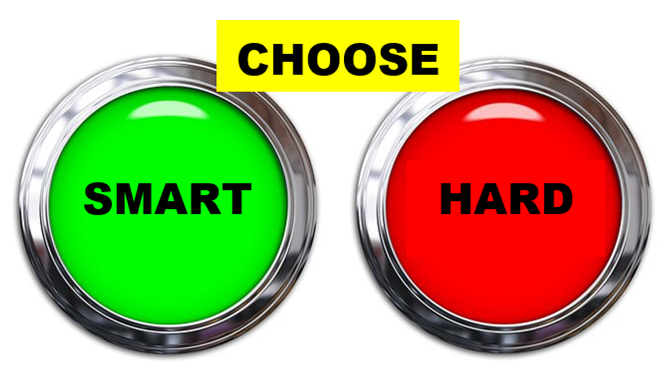What the heck does it mean to Work Smarter, Not Harder?

This phrase has always puzzled me. For most of my life I have been taught to work hard. It was emphasized in every aspect of society, especially the education system, how hard work pays off. If you ask most successful people about success, most would hail hard work as the biggest contributor to their success. Furthermore, it was the social norm to be rewarded for hard work. The best employees were promoted for their hard work. It was thought to be the only way to get ahead in life, i.e. out work your competitors, and work, work, work. Has that changed and is so, when did it all change?
I would say in the past couple decades, the tables have flipped and hard work is not as precious as it once was. It appears it has been replaced by smart work. Has hard work really been thrown away as a staple in society? Work smarter, not harder tends to imply just that.
This cliché, Work smarter, not harder, grew legs throughout the transition through the generations, from baby boomers generation to Generation X to the Millennials. As technology and social networking expanded so did mindset about smart work. Basically, easy, quick, and simple began to squeezed out Hard. The undercurrent behind this movement was people wanting more time to spend with family and do the fun things that matter outside of working so much. The desire for work flexibility and work-life balance became forefront in this shift. This cliché became a mantra and reminder of this movement.
 Below are 25 examples that collectively define smart work by contrasting it to stereotypical thoughts about hard work (Smart vs. Hard):
Below are 25 examples that collectively define smart work by contrasting it to stereotypical thoughts about hard work (Smart vs. Hard):
- Precision vs. Brut force
- Continuous improvement mindset vs. Status quo mindset
- Innovative vs. Repetitive
- Figure it out vs. Stick to what you know
- Wise vs. Intelligent
- Analytical thinker vs. Order taker
- Do important things first vs. First in – first out
- Ask for forgiveness vs. Wait for permission
- Self leadership vs. Hierarchical leadership roles
- Embrace change vs. Resist change
- Seek to learn vs. Wait to be told
- Have a scheduled finish time vs. working until finished
- Relaxed vs. Anxiety
- Fun vs. Uptight
- Resourceful vs. Narrow minded
- Team vs. Independent
- Know the goal vs. Do everything
- Sound judgement vs. Nit picky
- Manage time vs. Ignore time
- Focused Thought vs. Multi-tasking
- Accepting vs. Judgmental
- Life Balance vs. Overworked
- Result oriented vs. Time oriented
- Try something new vs. Accepting inefficiency
- Declutter vs. Holding on for the raining day

To sum all of this up, use your smarts to find the easiest way to complete your task with quality so you will have time for the things you really want to do. Easy and simple are not to be avoided; expect them. Accept challenges and get help to execute those things that seem hard. Take action by reevaluating your routine and take a smarter approach to making change. It is the smallest changes that will ignite a continuous state of positive habit and happiness.
Claudette,
I very much so agree with your statements and everything on this post, it is very educational. My step-dad and a few of my friends are always poking fun of me for going about life the harder way. I’m always a cussed of the opposite “working harder”. Sometimes it’s best to step back take a deep breathe and size things up. There usually is a easier way to go abouts things if we just do this.
Noah, it’s always good to acknowledge where you are, whether you lean on the side of working smarter or working harder. We sometimes need reminders to take a deep breathe and size things up as you put it. Thanks for commenting.
Great article and insight into working smart rather than hard. Love it.
I would add that I have learned to – rather than procrastinate, like oh dear what do I do – to – just get on and do what you can do and the rest will follow.
You would be able to make that sound a lot better for sure! 🙂
Great point Colin. I appreciate the compliments. In your scenario, I would say, Face challenges vs. Procrastinate; or how about Take action vs. Paralysis analysis. Thanks for commenting.
Work smarter not harder. Exactly I’d like to go this way because I am tired of Work Hard and I think there is always another way easier way Work Smart.
I agree with you Tibor. Too often, people are too busy working hard that they don’t even look for or expect an easier way. We have to overcome the notion that work has to be hard. Thanks for commenting.
Very good concept. I think that I combine the two a little in my job because it requires the production to stay constant. This means I have to incorporate a way of getting things done expeditiously which requires me to be smart of how the process is to be done. Then it is the hard work that gets it done. Does that make any sense? That is how I feel about what I do at work.
But as far as some other things go working smarter means not bumping against the wall trying to make something work when I can re-evaluate the situation and just plain do it smarter.
I agree Ronnie. What you notated makes alot of sense. Smart work and hard work can go hand-in-hand. There are situations that dictate both of them. I just want to point out the shift in paradigm to hail working smart at least an equal to working hard. Working smart is not a dirty word, and in fact, it should be rewarded. Thanks for commenting.
Wow. This post took me by surprise – you’re right! I do work too much! LOL. Thanks for the helpful tips. I’m excited to focus on more of this with the New Year around the corner.
Thanks for commenting Erin, and best of luck in the upcoming year with accomplishing your goals in a smart way. Make 2018 a great year and don’t work too much! LOL
Nice post. For me, the phrase points to one wanting to be in control their life. The cookie-cutter lifestyle is no longer. Nowadays, people are more self-aware and the information age has enlightened and made way for many to become wealthy in their own way.
Great points Maurice. Technology and social media have definitely exposed the average person to way more information. By seeking their own way, people are far more open to doing things outside of the box. Thanks for commenting.
Hi Thanks for the useful information. Always heard people talking about work smarter, not harder. Here you give 25 specific examples to show what exactly is work smarter and work harder. In the future, before I start any job, I will apply work smarter rule: think about the smarter way before initiating the job process. Nice work!
Anthony, I’m happy you will consider using some of these items in your next job process. The smart rules also apply in other life matters as well. Thanks so much for commenting.
Loved this post! For me, working smarter is putting the work in now so that, in the near future, I won’t have to work at all but see my income streams grow on there own. Your 25 examples that you list really ring true and caused me to really think about how they apply to me.
Nathan, that is an excellent way to define working smarter. I wish I had included that 🙂 Creating passive income vs. exchange time for money is the way I would have described it. Actually, this definition is one of personal favorites. Thanks for pointing this out.